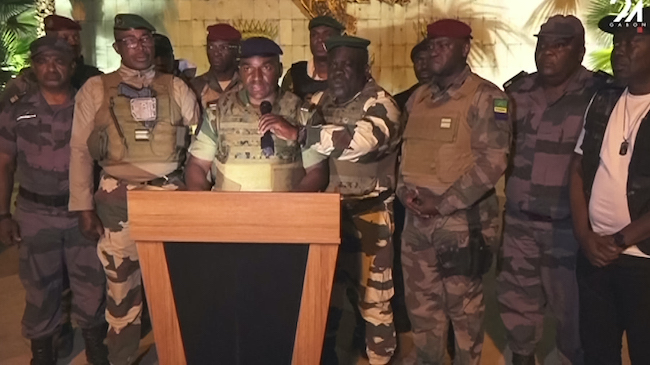
DEMOCRACY’S recession in Africa gathered momentum on Wednesday when military officers staged another coup in Gabon to the consternation of the international community. Claiming that last weekend’s presidential election that returned the incumbent to power was massively rigged, the military overthrew Ali Bongo, who had been in power for 14 years. The putschists elevated a general, Brice Nguema, head of the Republican Guard in charge of presidential security and a relative of the deposed Bongo, to the post of head of state. They put Bongo under house arrest and also arrested his son, Bongo Ondimba, whom they accused of treason. After the July 26 military coup in Niger Republic, this is a dire warning that democracy is endangered in Africa.
Rightly, the coup in Libreville has attracted global rejection. ECOWAS Chairman, Nigeria’s President Bola Tinubu, condemned it, warning that “contagious autocracy is spreading in Africa.” The African Union, the European Union, and the United Nations were also unanimous that the military should reinstate Bongo. The Commonwealth described the coup as “deeply concerning.”
Their message is appropriate. Military dictatorships are an aberration; they are also horrible, and often more corrupt than the civilians they overthrow. The coup in Gabon is the seventh in Africa in the last three years. It confirms the alarm raised recently by the UN Secretary-General, António Guterres, of an ongoing “epidemic” of coups in Africa. Since 2020, soldiers have overthrown democratic governments or other military juntas in Chad, Mali, Burkina Faso, Sudan, Guinea, Niger, and now, Gabon.
These put democracy in a fragile moment. However, democracy remains the best form of representative government available to mankind. It sustains the freedoms, inclusion, and socioeconomic growth, as seen in the Western democracies, and emerging economies like South Korea, and Taiwan.
Africa is in a political dilemma. Since the end of July, ECOWAS has been preparing to deploy military force to oust the usurpers in Niger, who accused the detained president, Mohamed Bazoum, of corruption and replaced him with a general, Abdourahamane Tchiani.
As usual, jubilation accompanied Bongo’s removal. People trooped out in Libreville and Port Gentil to celebrate the end of the 55-year long Bongo dynasty. Ali had succeeded his father, Omar, in 2009. He ‘won’ 64.27 per cent of the ballot on Saturday against his main challenger, Albert Ossa’s 30 per cent in an election widely regarded as tainted.
This is the crux of the pervasive coups in Africa: corrupt, sit-tight leaders are giving democracy a very bad name. In Gabon, Omar assumed power as the second president in 1967, spent nearly 42 years till his death in 2009 and was succeeded by his son. The family has faced accusations of fraud. In 2017, Bongo was probed for owning 39 houses and nine luxury cars in France.
Though an oil-rich country of 2.3 million citizens, bad governance is prevalent there. The World Bank says many citizens live below the poverty line. This prepared the ground for the latest coup after an unsuccessful attempt in 2019 by the military to overthrow Bongo, who had suffered a stroke while on an international tour a year earlier.
Across Africa, sit-tight dictators are besmirching governance. Theodore Mbasogo has spent 44 years as president in Equatorial Guinea. In Cameroon, Paul Biya is in his 42nd year; Dennis Sassou 36 years in the Republic of Congo; Yoweri Museveniof Uganda 35 years; Isaias Afwerki of Eritrea 30 years, and Paul Kagame in Rwanda 23 years. The late Robert Mugabe refused to quit as Zimbabwe’s president and serially rigged re-election until he was forced out by a coup. This is a recipe for the violent change being witnessed continent-wide.
For Africa to escape incessant coups, the leaders must radically change their dictatorial, sit-tight tendencies. Incumbents should conduct credible elections and stop the toxic habit of altering the constitution to overthrow term limits and perpetuate themselves in power.
They must shun corrupt enrichment and govern with high standards, emulate the mature democracies and imbibe the basic tenets of democratic practice to rid the continent of dictators and drive its development.





